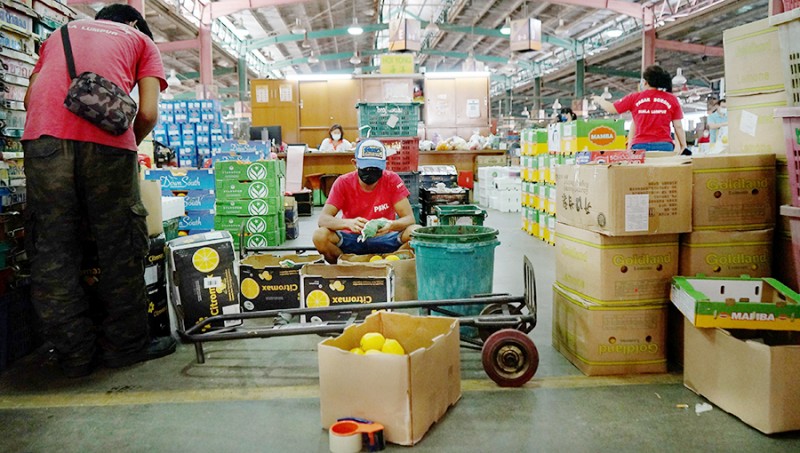
Image credit: The Malaysian Reserve
PETALING JAYA: The debate on minimum wages has heated up again amidst rising prices of goods and the emergence of businesses from the recession.
On one end, the Malaysian Trades Union Congress has urged the government to accelerate the implementation of the minimum wage at RM1,500 to help workers cope with their rising household expenditures.
And on the other end, businesses say they are not ready to implement the proposed new rate as they are still reeling from the economic shock brought on by Covid-19 and the devastating impact of the recent major floods.
At present, the minimum wage in Malaysia is set at RM1,200, after it was raised from RM1,100 in February 2020.
A minimum wage of RM1,500 is notably below the national poverty line income of RM2,208 per household per month.
Over the weekend, Human Resources Minister Datuk Seri M. Saravanan said a minimum wage of “around RM1,500 a month” is expected to be implemented by year-end.
Notably, there are questions as to whether a minimum wage of RM1,500 would suffice and if now was the right time to implement the wage hike.
According to Dr Yeah Kim Leng, professor of economics at Sunway University Business School, the RM1,500 rate may come across as a jarring increase for employers, particularly given that small and medium enterprises are not in a financially healthy position coming out of the pandemic.
“Given the current softness in the economy, we may want to consider a gradual rise instead of a sharp jump in the minimum wage. But this is up to the tripartite discussion.
“I think gradually increasing the rate over the next two years is a reasonable duration, taking into consideration that businesses are only emerging from the recovery and because of the sizeable portion of salaries on business costs,” he told StarBiz.
In a statement on Monday, the Federation of Malaysian Manufacturers (FMM) said producers are generally concerned about an immediate increase to RM1,500 but are receptive for a gradual increase under the current minimum wages review to a quantum to be decided by the National Wages Consultative Council (NWCC).
FMM opined that a gradual increase in the wage rate would still be able to address the current increase in the cost of living.
Yeah also noted concerns that if businesses were pushed too hard, they may pass through the higher cost to consumers.
This may push prices further and cancel out the effects of an increased income.
However, the impact of the rate is relative to the cost of living in different geographical locations. For some states, a minimum wage of RM1,500 could be considered high, while for other states like Kuala Lumpur, the rate may be low.
“What’s important is that the minimum wage keeps pace with the rising cost of living and the improving productivity,” Yeah said.
He acknowledged that balancing the needs of employees and employers in the current landscape is a tricky issue.
“We are in a catch-22 situation. Businesses are not strong enough to make the adjustments because of thin margins and losses suffered during the pandemic. If pushed too hard, rather than improving the lives of low wage earners, businesses may collapse.
“To address this issue, what is needed is better quality data. The NWCC should have access to the relevant data and consider whether RM1,500 is doable for all the industries. Use the data and make evidence-based decisions, especially to what extent can businesses handle the increase in wages,” he said.
One option to address the issue is to look at minimum wages from a sectoral perspective, as different sectors have different benefits and incentives that may make up for lower base salaries.
“But this is harder to implement and there could be loopholes that employers or employees may use. So it needs data and careful analysis. But it could be a more sustainable way as some better performing industries may be more hard pressed for workers.”
On the other hand, should the various stakeholders deem RM1,500 as a suitable rate to adjust to, Yeah thinks the government can play a role in enabling businesses to pay higher wages by defraying the cost of the increase through tax incentives over the next one to two years.
That said, the government and employers will need to have longer-term plans to address rising wages.
Businesses will have to wean off low-wage employment and improve their productivity through the use of technology or consider relocating their operations to lower-cost markets.
“Employers will need to prepare for this in the longer run. The government can help by giving them incentives to increase productivity such as through automation.
“But wages must increase. It is necessary. If wages are kept low for too long, it doesn’t benefit the overall economy. We need wages that commensurate with productivity.
“Workers should focus on improving their skills and their productivity so that they will always be above the minimum wage,” said Yeah.
Source: https://www.thestar.com.my/business/business-news/2022/02/10/minimum-wage-a-tricky-issue

